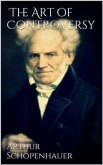"The Art of Controversy" by Arthur Schopenhauer is a compelling and insightful exploration of the nature and strategies of intellectual argumentation and debate. In this thought-provoking work, Schopenhauer offers a comprehensive guide to engaging in productive and effective discussions, while also exposing the fallacies and pitfalls commonly encountered in contentious exchanges. Schopenhauer's keen intellect and analytical prowess are on full display as he dissects the art of argumentation. He explores the tactics employed by skilled debaters, uncovering the strategies they use to sway opinions and manipulate opponents. By examining these techniques, Schopenhauer equips readers with the tools necessary to navigate controversial discussions and to recognize and counter fallacious reasoning.








